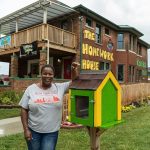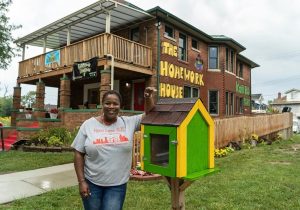On June 6, 2023, Detroitisit, kicks off the inaugural Business of Food Summit in Eastern Market. The summit will focus on conversations about food funding and policy, equity and justice, urban farms and grocers in addition to, highlighting chefs and the making of the restaurants in the food space. One of the featured panels, from 10:35-11:30 am, is on Food Waste and Composting featuring speakers Dave Bowers of WM, Nicole Chardoul of NextCycle, Devan Dodge of EGLE, and Renee Wallace of Does Edge. Watch the full panel here.
As we’re beginning to see, it’s time to improve the way food waste and composting are handled throughout Detroit and beyond. Here, we explore the variety of ways composting is a major climate changer and highlight organizations and leaders that are a part of the quest to make Detroit a sustainable and thriving food community. As we’ve come to learn; it’s only waste if it’s wasted.
The Michigan Department of Agriculture and Rural Development (MDARD) reported that in 2022 Michigan’s food and agriculture exports broke records totaling $2.7 billion for the year. The Department works to sustain environmental stewardship, provide consumer protection, assure food safety, enable rural development, and more. Jamie Zmitko-Somers, MDARD’s Agriculture Development Division director shared, “It’s clear there is a strong consumer demand for delicious, reliable, and quality Michigan products across the world.”
Yet, then, how is it that Michigan is considered a leader in agriculture throughout North America yet, Detroit is not considered a food-secure community?
CEO of Doers Edge LLC, Executive Director of FoodPLUS Detroit, and CEO and President of ReMark and panel moderator, Renee Wallace, has worked for years with farmers and food businesses creating strategic planning initiatives to address food insecurity throughout Detroit. She does this by challenging the way food businesses think about waste. Wallace helps them to see that composting can be the superpower we need to address climate change. She says,
Detroit is in the state that has the second largest agricultural export in the country. We have all the potential we need. When people think about waste they think it has no value.
Wallace’s goal throughout the organizations she works with is to keep waste away from landfills. She breaks down food to waste into food categories, green, yellow, and red. Green is identified as ready to go to retail, on tables, and into markets. Yellow means time is running thin on getting it into the mouths of the community. Red means it is not consumable by humans but may be consumable by certain animals and used to feed the soil.
According to the Report of Solid Waste and Landfills in Michigan, total waste disposal in Michigan landfills was recorded at 51, 990, 037 cubic yards which increased by 2.1 percent since the previous year in 2021. Wallace mentions that although a nuisance now, at one point landfills were a solution to incinerators. The incinerator created air pollution and created asthma and alike conditions. Wallace believes a vast majority of the food that ends up in a landfill could be redirected into composting. She explains that due to waste being piled on top of each other, week by week, there is no oxygen and the exposed landfills create methane that creates major damage to our atmosphere. Through composting Wallace believes we could impact the water system and improve efforts against flooding. We can create new landscapes with composting. As we spread the compost throughout the land we will pull carbon out of the air and put it back into the soil. Wallace shares,
We have to ensure we have these policies and programming to allow composting in our city. We are closer to a food-secure city than we think.
In 2022 The PLEDGE on Food Waste a national program, launched in Detroit, by Danielle Todd of Make Food Not Waste with the goal to prevent food from going into landfills, to help heal the climate, and make good use of all food. By taking the PLEDGE restaurants embark on a journey to fight climate change by reducing their food waste. 30 restaurants including Avalon Bakery, Baobab Fare, Sister Pie, Good Cakes and Bakes, Folk, and MINK are going through seven key pillars of learning. The learning criteria include using food waste and use of a monitoring technology. The restaurant employees are taught the sustainable way to handle food before preparation and process documentation, food preparation and offerings, receiving tailored support, expand employee commitment, and receive technical workshops by accredited waste consultants. The program uses a methodology aligned with United Nations’ Draft Food Loss and Waste Standard. The food loss and waste standard is a set of 17 goals, reporting requirements, and global definitions for the countries of the UN charter. By pledging to this system, the restaurants are showing the community that it is possible to be a sustainable and successful food business.
Nicole Chardoul, Principal and Vice President at Resource Recycling Systems (RRS) and panelists shares, “A lot of times the waste part of things is missed when we talk about food policy,” For the last 25 years, Chardoul and the RRS team has surveyed and analyzed residents, schools, hospitals, food business, and farmers to confirm that there is a need for a system to be set in place for food waste and composting. She began working in a lower Michigan community to build an insurer to process and take in organic waste. The Traverse City community wanted to use unused and leftover food for community donations. The community also wanted to collect inedible food for animals. Chardoul was excited to see sustainability implemented throughout this community and says,
Most times, in composting systems we collect food and compost it. However, in this system, I saw people being fed with the food that was left.
Chardoul and her team are working to implement a similar composting program in Detroit. She says, “Since we are not located in the city of Detroit it’s taking longer to execute because we need people on the ground to make the connection to each individual community.”
Founder and CEO of Scrap Soils Ricky Blanding is one of the people on the ground in Detroit helping to create the reality Chardoul is working toward. Scrap Soils is a mission-driven non-profit organization dedicated to reducing food waste, improving climate change, and reducing harmful greenhouse gas emissions through composting. Scrap Soils goes into the communities weekly to collect food scraps to turn into nutrient-rich compost and offer their services to commercial properties like grocery stores, restaurants, events, office spaces, and more.
Although Blanding says he throws it in a pile and lets life take over, a fourth-generation farmer and Executive Director of Sustainable Community Farms Michelle V. Jackson knows it’s not that easy. Jackson, the panel moderator, is also the chair of the Detroit Green Task Force Organic Recycling Committee. Growing up with a father and grandparents who farmed, she was able to see firsthand the importance of regular and urban farming. She saw how the community depends on the food her father grew and always knew the importance of compost. She explains that a major misconception about compost is that it smells and it attracts rodents. However, she says when composting is done correctly it does neither.
Jackson asks,
Could you imagine if every restaurant, house, and business was mandated to put their food scraps in a bin?
The Detroit Green Task Force is doing just that by connecting with the Detroit Food Policy Council (DFPC) to push the Detroit Sustainability Action Agenda. The Agenda was launched in 2019 to outline a strategic roadmap to make Detroit a green city. The agenda’s goal is to have access to live in affordable, quality, clean, and connected communities. DFPC aims to create a locally sustainable food system through the lens of food security, justice, and sovereignty. Together the DFPC and the task force are working on a pilot program to have curbside recycling citywide.
The farmers, organizations, and community leaders have paved the way in the food business to become a thriving money ecosystem for Michigan. However, it’s time for the community to fill in the gaps of food waste by implementing composting in our lives. It’s important to educate ourselves and others on what we can do to continue the recovery of our climate one banana peel at a time.
The Food Waste & Compost panel is 10:35 -11:30 am June 6.
Register for the one-day, two-part free Summit here. 9 am-5 pm panels and discussions. 5:30-9 pm food truck competition, cash bar, and more.
As always, be sure to subscribe to our newsletter for regular updates on all things Detroit.























[…] https://detroitisit.com/june-6-detroitisit-hosts-a-panel-of-food-waste-and-compost-innovators-during… […]